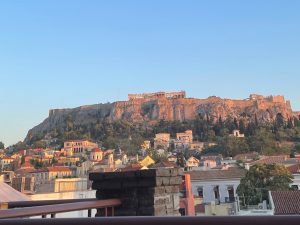For several of our students, English is not their first language, forcing them to work harder every single day, but also providing them with an opportunity. Angela Demian, Year 13, and Santiago James González, Year 10, have taken time out of their busy schedules to tell us a bit more about the positives of being multilingual.
Angela:
At the end of Year 12 I was given the opportunity to sit Greek A Level. It was an incredibly valuable experience as not only was I able to obtain an additional A level qualification at a grade A* but it also helped practise and refine my exam skills early for the rest of my Year 13 examinations.
Having an additional A level was beneficial towards my UCAS university applications as it adds an aspect of diversity to my qualifications that is desired by many of the top universities.
As a fluent speaker of English, Arabic and Greek, I believe my linguistic skills have strengthened my written and verbal communication, both essential qualities for my chosen future career and many others. My multilingual nature has exercised my mental flexibility and improved my multi-tasking skills.
This worthwhile opportunity allowed my organisational and time management skills to mature due to having to balance an additional exam with the rest of my studies, enrichments and university admission tests.

Santiago:
My mum is Spanish and only speaks to me in her own language, so Spanish has always been my ‘mother tongue’. Looking back, I was aware that speaking another language made me different to other children, but for me that was just normal.
Every Christmas and summer were spent in Spain with family and friends so my accent got better to the point where people couldn’t tell that I lived in England. At the beginning of each summer holiday, I went away to camp in León in the north west of Spain. I would spend two weeks not speaking any English but learning about Spanish culture, traditions, jokes and Spanish slang. Whilst in León I also helped in a food kitchen for pilgrims on the ‘Camino de Santiago’ and translated for many English speaking pilgrims.
Last year I spent the spring term attending school in Madrid. It was odd not speaking English for three months and was very tiring being educated in Spanish when I had never experienced that before. It was fantastic living in a capital city because it let me really immerse myself in every aspect of Spanish culture, from studying the history of the country to modern day entertainment like going to Real Madrid matches or hanging out with friends in the city centre.
Last summer I did my Spanish GCSE. I could have just sat the exam and passed as a bilingual speaker. However, to get the top grades I knew I had to have a rigorous and methodical approach to preparing for the exam. I revised grammar on line, did past papers in reading, listening and writing, but most importantly I learned how to develop my answers for the speaking exam that would fulfil all the criteria demanded to achieve the highest grade. That took time and hard work, so I am really proud that I got a 9.
Although it has been frustrating doing extra Spanish reading or grammar at home, I am now enjoying the benefits of being bilingual and know that it will give me a great advantage in the future.


